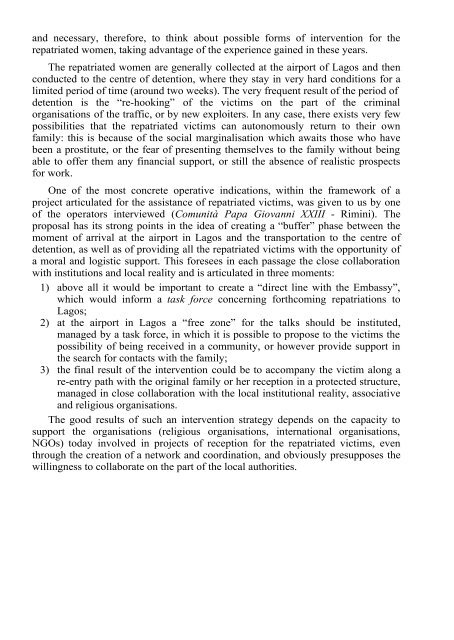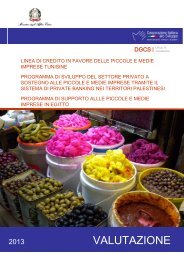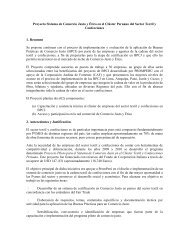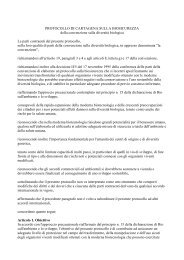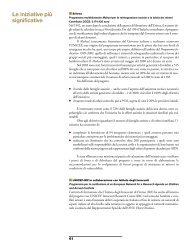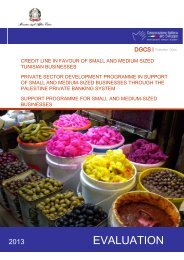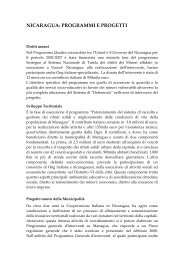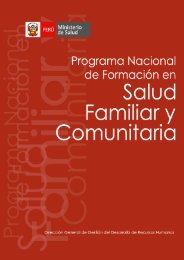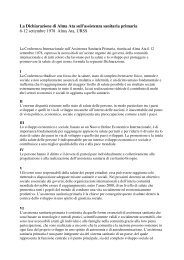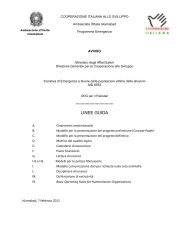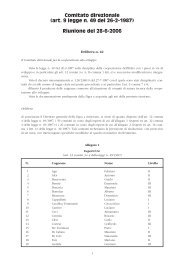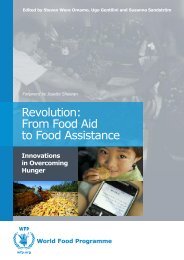here - Cooperazione Italiana allo Sviluppo
here - Cooperazione Italiana allo Sviluppo
here - Cooperazione Italiana allo Sviluppo
Create successful ePaper yourself
Turn your PDF publications into a flip-book with our unique Google optimized e-Paper software.
and necessary, t<strong>here</strong>fore, to think about possible forms of intervention for t<strong>here</strong>patriated women, taking advantage of the experience gained in these years.The repatriated women are generally collected at the airport of Lagos and thenconducted to the centre of detention, w<strong>here</strong> they stay in very hard conditions for alimited period of time (around two weeks). The very frequent result of the period ofdetention is the “re-hooking” of the victims on the part of the criminalorganisations of the traffic, or by new exploiters. In any case, t<strong>here</strong> exists very fewpossibilities that the repatriated victims can autonomously return to their ownfamily: this is because of the social marginalisation which awaits those who havebeen a prostitute, or the fear of presenting themselves to the family without beingable to offer them any financial support, or still the absence of realistic prospectsfor work.One of the most concrete operative indications, within the framework of aproject articulated for the assistance of repatriated victims, was given to us by oneof the operators interviewed (Comunità Papa Giovanni XXIII - Rimini). Theproposal has its strong points in the idea of creating a “buffer” phase between themoment of arrival at the airport in Lagos and the transportation to the centre ofdetention, as well as of providing all the repatriated victims with the opportunity ofa moral and logistic support. This foresees in each passage the close collaborationwith institutions and local reality and is articulated in three moments:1) above all it would be important to create a “direct line with the Embassy”,which would inform a task force concerning forthcoming repatriations toLagos;2) at the airport in Lagos a “free zone” for the talks should be instituted,managed by a task force, in which it is possible to propose to the victims thepossibility of being received in a community, or however provide support inthe search for contacts with the family;3) the final result of the intervention could be to accompany the victim along are-entry path with the original family or her reception in a protected structure,managed in close collaboration with the local institutional reality, associativeand religious organisations.The good results of such an intervention strategy depends on the capacity tosupport the organisations (religious organisations, international organisations,NGOs) today involved in projects of reception for the repatriated victims, eventhrough the creation of a network and coordination, and obviously presupposes thewillingness to collaborate on the part of the local authorities.


